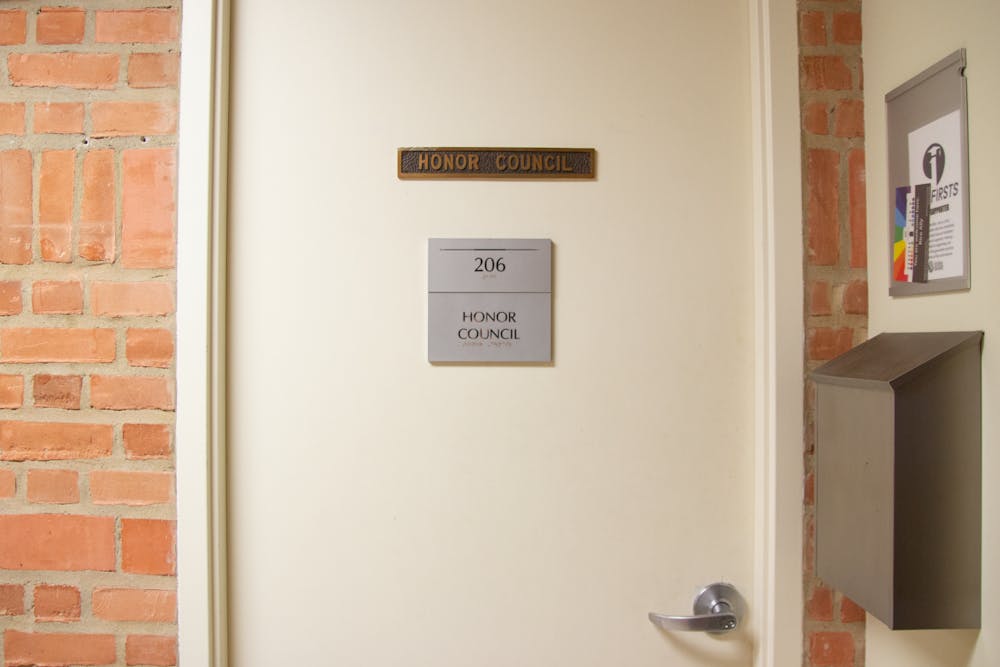Honor Council limits use of ChatGPT

The Honor Council sent an email to all undergraduates on April 11, announcing an Honor Code amendment explicitly prohibiting the use of artificial intelligence software such as ChatGPT without proper citation. Additionally, the email clarified professors’ right to ban the use of AI software for their classes.
“Utilizing AI software to generate ideas and pass them off as one’s own will also be considered plagiarism and will be adjudicated as such by the Honor Council,” the email said.
The email also clarifies that use of AI software “for your own study purposes is allowable.”
Rodolfo Gutierrez-Garcia, Honor Council internal vice-chair, explained that rather than creating a new policy, the amendment was a clarification of previous policy.
“We’re going to be treating it like any other resource,” Gutierriz-Garcia, a Baker College junior, said. “If you don’t cite it when you use it, that’s plagiarism.”
According to Honor Council communications chair Pedro Ribeiro, this decision was driven by the Honor Council.
“Administration had no play in this at all,” Ribeiro, a McMurtry College sophomore, said. “We only started meeting with [administration] to really facilitate outreach … We thought it was a common-sense amendment we could pass.”
Ribeiro added that the Honor Council would consider evidence such as revision history and proper citation of AI software when adjudicating cases. According to Gutierrez-Garcia, the Honor Council is not currently planning to use AI detection software for various reasons.
Maya Irish, an associate professor of history, said she intends to prohibit the use of AI in her classes.
“My plan is to be very explicit throughout my policies regarding ChatGPT or any other artificial intelligence tools,” Irish said. “I’m thinking of just banning it all together and making it very explicit in the syllabus that it’s not allowed. If [students] have … a good argument why they have to use it, they’d have to ask me.”
Additionally, Irish said her class’ policy would extend to the use of AI tools for personal study purposes.
“[The policy] says using AI for your own study purposes is allowable … that point seems very problematic to me, because I ask students to find articles on the subject of their research and read them,” Irish said. “If they’re just going to go and use artificial intelligence to summarize them, that defeats the purpose of education.”
Mack Joyner, an assistant teaching professor in the computer science department, said he has a more positive view of AI software.
“It’s important not to highlight only the negative side of ChatGPT, but the positive aspects,” Joyner said. “From that standpoint, [faculty] need to really think through in which cases it should be allowed.”
Joyner said potential applications of AI software in the computer science department include improving a student’s existing code or debugging programs.
“If there’s an error [students] could ask for more information, maybe, what are the possible solutions to fix this particular error,” Joyner said. “Students ask that now, but maybe [with AI software] they can get a more detailed answer that leads them to a solution, instead of spending hours trying to define what that particular solution would be.”
Sid Richardson College sophomore Michael Wong said that he believes the clarified policy is reasonable.
“It seems reasonable to me that you can’t pass off the AI’s work as your own,” Wong, a computer science major, said. “But also I don’t see a problem with using it like a tool. It’s like Google on steroids.”
However, Wong said he still had some confusion over the permissible uses of AI software.
“I wrote code for this assignment and it passed,” Wong said. “I asked the AI, ‘Is there a way I can optimize the code?’ It said, ‘you should try doing this’, and I tried doing that and it worked. The assignment is due in the future and … the AI’s code has concepts we haven’t already learned. I’m not sure if I’m allowed to use it.”
More from The Rice Thresher

Rice’s COVID class graduates amid nation-wide campus protests
Rice held its 111th commencement ceremony Saturday, May 4 at Rice Stadium. The class of 2024 walked through the Sallyport, which is currently closed amid ongoing construction of the academic quad, but was temporarily reopened for commencement. For the second year in a row, all undergraduate commencement events were condensed into one day — prior to 2023, ceremonies were typically spread out over a two-day span.

Rice SJP ‘liberated zone’ ends, university removes artwork in ‘beautification efforts’
The “liberated zone” on Rice campus and associated events ended Friday, April 26, after four days of programming, according to the Rice Students for Justice in Palestine Instagram page. Unlike overnight encampments spreading at college campuses across the country, Rice SJP disassembled the “liberated zone” each night and returned the following morning. And in contrast to clashes and escalating police responses that have led to some 2,000 arrests from Los Angeles to Hanover, N.H., there were “no major incidents and no arrests” at Rice, according to President Reggie DesRoches.

Rice Students for Justice in Palestine declares ‘liberated zone’ on campus
As student protests erupt across the country, Rice Students for Justice in Palestine launched a “liberated zone” on Rice campus, announced a two-day series of events and started construction on an “apartheid wall.”

Please note All comments are eligible for publication by The Rice Thresher.